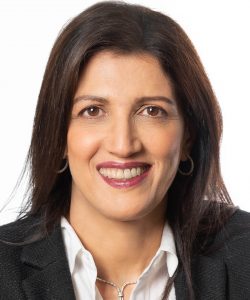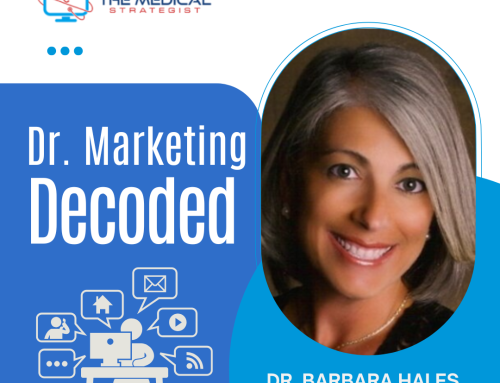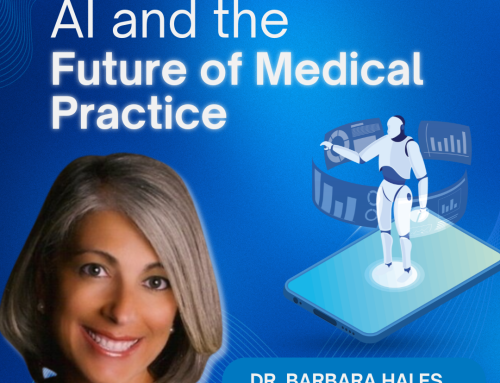Podcast: Play in new window | Download
Subscribe: RSS

In this episode, Barbara and Talya discuss:
- The importance of good communication between doctors and their patients
- Creating a strong partnership with patients
- How giving support to patients can have a significant impact on them
Key Takeaways:
“To acknowledge and be honest, is the best thing you can do.” – Dr. Talya Miron-Shatz
Connect with Dr. Talya Miron-Shatz:
Website: https://talyamironshatz.com/
LinkedIn: https://www.linkedin.com/in/talya-miron-shatz/
Twitter: https://twitter.com/talyamironshatz
Facebook: https://www.facebook.com/TalyaMironShatzAuthor/
Connect with Barbara Hales:
Twitter: @DrBarbaraHales
Facebook: facebook.com/theMedicalStrategist
Business website: www.TheMedicalStrategist.com
Show website: www.MarketingTipsForDoctors.com
Email: Barbara@TheMedicalStrategist.com
Books:
YouTube: TheMedicalStrategist
LinkedIn: www.linkedin.com/in/barbarahales
TRANSCRIPTION (085)
Dr. Barbara Hales: Welcome to another episode of Marketing Tips for Doctors. I’m your host, Dr. Barbara Hales. Today, we have with us a real powerhouse.
Talya is a doctor in social psychology. She is an international leader at the intersection of medicine and behavioral economics. With over 20 years of experience as a researcher, consultant, and entrepreneur, she uses a uniquely broad perspective to identify psychological barriers that prevent us from making good medical decisions, both minor and crucial ones and develops ways to overcome those barriers.
This is especially important for doctors and people in the health field. Because we know that most people know the choices that they should make, it’s just including the doctors themselves. It’s just a question of, do they make the right choices for lifestyle? And why not because as we all know, making the proper lifestyle choices is going to cut down on various health ailments and decrease in the need for medicine.
Dr. Miron-Shatz did research at Princeton University with Nobel laureate Daniel Kahneman. She taught at Wharton and published dozens of academic papers on how laypersons and doctors in hospitals, online, at home, and just about everywhere, understand medical information and make healthy choices.
Her clients include Johnson and Johnson, Pfizer, Samsung, digital health companies, and major players in the health industry in North America, Europe, and Israel. She is a senior fellow at the Center of medicine in the public interest in New York, a professor at the Ono Academic College in Israel, and a visiting researcher at the Winston Center for Risk and Evidence Communication at the University of Cambridge. Welcome to the show, Talya.
Dr. Talya Miron-Shatz: Thank you so much, Barbara. It’s really wonderful to be here with you today.
What do patients think of doctors?
Dr. Barbara Hales: A social psychologist is not something that we often get to speak with. So I’m delighted.
What do patients have to say about doctors? How do you persuade someone to be complimentary when they may not have considered it before? And what matters to them, after all, we both know that when everything is going well, and the patient is content, they’re probably less inclined to run to a raiding site than someone who is enraged and says, boy, oh, boy, I can’t wait to go on this site and complain. So, how can you get patients to not only like their doctor, but give them five stars and positive reviews?
Dr. Talya Miron-Shatz: I think that liking your doctor is the first step. It’s a significant step forward. And, in some ways, I believe it begins with the feeling that your doctor likes you, or at the very least, cares about you. Doctors have a difficult job. They work in highly stressful environments. They bear a great deal of responsibility. Their customers aren’t always cheerful and serene. And they are rated not only on their medical skills but also on how they treat their patients. And I believe that is pivotal and critical.
It’s essential in two ways. And the first is the medical route. Because when a patient believes that their doctor genuinely cares about them, they are much more likely to stick to their treatment regimen. They are leaving aside the relationship troubles and the rating. I’ve seen it and read about it with HIV patients, diabetic patients, HIV patients, and women trying to conceive. However, if they believe their doctor would disapprove, they will not inform them. That’s terrible because if they inform their doctor, the doctor can assist them in protecting their embryo, but they’re not telling you because they’re terrified of their doctor’s disapproval.
Doctors as parental figures
Dr. Barbara Hales: I spent a lot of time thinking about it because your doctor is simply a person who provided you with a service. Why would you risk your health because of how your doctor treats you? I concluded that we regard doctors as parental figures in some ways. And when a parent rejects me, I react in a way that leads me to believe I’m unworthy. That’s how children think. That’s the best I could come up with. And it’s such a depressing response. So, with that in mind, I believe it helps doctors comprehend how important they are in their patients’ eyes, even if they see 30 patients a day. And, no offense, they can’t recall their own names.
Dr. Talya Miron-Shatz: It doesn’t help at all. I’m not saying that people should not be held accountable or responsible for their health; they should, after all, it’s their body. They are the only ones who can truly treat it well, yet there is a method to their madness. This brings us back to the rating platforms.
I did a study because I was so curious, and I studied 100 thank you letters that people sent to medical centers and doctors, and they were uploaded online. People like to rant on the internet, and I like to compliment on the internet as well. As a result, this is what the medical centers choose to display on their websites.
What I discovered was that patients were just as likely to compliment doctors on how they treated them as individuals as they were on their medical care. It was all about the personality and manner, which were just as vital as the care. This is important for doctors to remember since patients remembered even the smallest details about how they were treated as individuals, such as “I enjoy up to he always brings me from the waiting area and helps me” or “the technician held my hand during the ultrasound exam.” She was under no obligation to do so. They remember and value every small thing. What they don’t remember in great detail is medical attention. They’re considerably more inclined to say with great care.
What does this imply? That indicates I’m not sure. I’m not sure if you gave me the best medication. I’m not sure if my wound would have healed differently if I had gone to a different doctor. I have no idea. I’m not a professional. Where you look me in the eyes is where I am an expert. Have you said hello? Did you say how you’re doing? And I believe that the things that doctors can do can make a significant difference.
I have one more thing to say about it. I’ve written a number of studies on delivery. And delivery is a significant challenge. We concentrated on unplanned cesarean deliveries. No woman would ever declare, “Oh, I want an unplanned cesarean delivery.” So you have a medical issue, a psychological challenge, and the doctor will try their best. How can we prevent it from becoming a trauma? And what we discovered was that women valued the support they received, and it was damaged when they did not receive support. That was far worse; needing assistance and not receiving it is far worse than receiving assistance. And, because we’re discussing an emergency procedure, I’m not talking about anything that would take up the entire day.
These include things like being included in the decision-making process. So I can imagine doctors rolling their eyes and saying, well, she knows the psychologists are involved in the decision-making process, she should do it herself. What this entails is something like stating, “Listen, we need to execute an emergency C section. Is that all right with you? We know this is what you had in mind.” What will the lady say? Yeah, she responds, because she wants to live and wants her baby to live. By asking her that, you’ve just made her a partner and included her in the decision-making process, which is huge. That’s preferable to treating her as an abdomen that you’re about to cut up right now. That makes a significant impact. There was emotional assistance available.
Nobody can promise that everything will be well because nobody can promise that I would do my best for you. These are some quite strong words. It creates a strong partnership.
Dr. Barbara Hales: Absolutely. That is extremely important. I used to have patients tell me that not delivering it naturally made them feel less of a lady. And I used to tell them, “Listen, you’re the woman at three o’clock in the morning when you’re getting up to feed the baby.” Being a member of the medical team and being in charge of some of the decisions is really important.
Dr. Talya Miron-Shatz: I couldn’t agree with you more on the importance of informed support. And that can be very tiny. And I’ll give you an incredible example.
We conducted a study in which we reviewed blogs from women whose births deviated from their birth plans. And we learn about the difficulties they faced and how they overcame them. And occasionally they come to terms with it by saying, “Oh, that was amazing.” They didn’t always say anything. And we came to the conclusion that nothing is neutral. Does it suck? Yes, it is unpleasant. But I’m not going to discuss it because that’s simply life.
According to one woman, the epidural needle was inserted twice. She said that it was because I was shaking so much the first time. What does this imply? That suggests she was aware of what was going on. She was well aware that the doctor was careless. She realized what had happened. Did she say it was amazing? No. But did she say it was bad? No, because she accepted it. That is something that a doctor can do. This informational assistance came in the course of 10 seconds, as I now comprehend what is happening to me. That’s a lot better than what I’m doing, which is making me unhappy for no apparent reason.
Dr. Barbara Hales: Well, for a moment let’s go to the patient that is unhappy with the result. She doesn’t feel that she was treated on a personal level. And she complained. Knowing how do you deal with the complaint letters to correct the situation?
Dr. Talya Miron-Shatz: I believe, as with many other things, and you basically described chronic disease and prevention, as well as just taking care of yourself. Prevention is the best medicine. That is always the most effective treatment. And I believe that acknowledging and being honest is the finest thing you can do. Going back to the letters, some of them were written by people who had not yet healed or whose partner they were writing for had not yet totally healed. They recognized that it is a process that things happen, that things are not perfect, and that they must accept this. They do, however, require reassurance that they are not alone. They must believe that they are respected. And that is massive.
Now, if you look at lawsuits, medical cases, and that’s like, amplifying the complaints, 80 percent of them include a component of “nobody explained,” or “I didn’t understand,” because it’s my responsibility. It is not the fault of the doctor. The doctor does not elaborate. So, I believe that explaining, re-explaining, and communicating are essential.
Even the brightest patients can be confused, find it difficult to follow, be in pain, or be anxious. And not everyone is smart. You don’t have to take an exam to become a patient. But, regardless of your intelligence, you have a right to know what’s going on. So I believe that communication, respect, and the honesty of simply expressing, “This may not work,” are all important.
Now, when someone explains it to you in that way, you understand, you feel like a partner, and you don’t feel as if someone is letting you down. Everyone desires hope. But what exactly does that imply? Going back to the other 100 persons who were handled in the same manner as you, how many people will this actually help? Three? Because this does happen from time to time. So, how realistic is this hope? Is this a false hope? I’m not sure. So if I’m promised hope, but my doctor knew it would only assist three women out of a hundred, and they weren’t completely honest with me. And I wasn’t making a good decision because I’m much more inclined to complain than if my doctor had advised 60/40 and I ended up in 40. But I knew there was a 40% probability of that happening.
Dr. Barbara Hales: Well, they do say better to live in hope than die in despair. Hope can do a lot. Sometimes a person’s own body will heal itself, with the positive attitude and the hope behind it.
Dr. Talya Miron-Shatz: It is important, but it must also be reasonable. I’m a really optimistic person, and some people accuse me of being Pollyanna. But I still want to know what I’m up against, and if I do, I’ll deal with it. It isn’t the end of the world, though. But I need to know, especially if I’m discussing something with someone since, as we all know, medical treatments can be uncomfortable and have unfavorable effects. If you select chemotherapy or surgery, for example, it will not be enjoyable or easy. And you should be aware of this ahead of time.
Dr. Barbara Hales: As you pointed out, the reason why it’s important for a patient to know how realistic the treatment is in the prognosis and outcome is that if you make light of the situation, and you give them false hope, then when they don’t heal in the way that you have implied, that’s when you’re going to see the lawsuits and the complaints come out. But if a patient feels that you’re taking on a case that may be nearly hopeless, and you’ve helped her, then you’re the hero and the miracle worker, and regardless of the outcome, she’ll be forever grateful. So it’s important that they do know exactly what they’re facing.
Dr. Talya Miron-Shatz: I agree. So I wrote a book, it’s called “Your life depends on it. What you can do to make better choices about your health.” I intended for it to be for patients, then I realized it’s also for physicians. It’s crucial for physicians because you guys have to understand the patient’s mindset when they are in your office and when they are at home that is imminent.
Dr. Barbara Hales: So how can people get a copy of that book for themselves?
Dr. Talya Miron-Shatz: It is on Amazon and everywhere. So I ended up writing, I knew I would write takeaways for patients, then I realized they have to write takeaways for physicians. And then the third set of takeaways is for healthcare systems. Because as I said, doctors are overworked. They’re stressed, and they have huge responsibilities. And they work within systems. For the most part, they do a lot of the things around establishing care and trust and creating good communications.
I developed a set of takeaways for healthcare systems to truly support and assist physicians in their work. One of the reasons I’m pushing the book so hard is because I believe it can make a meaningful impact for both patients and physicians. It can assist patients in having these realistic dialogues with physicians, making physicians’ lives easier.
Dr. Barbara Hales: I think that this is certainly something that should not only be on everybody’s shelf, but they should read it as well. So tell me how people who would like to hear more from you can reach you.
Dr. Talya Miron-Shatz: I have a website talyamironshatz.com. There’s a lot of information about me there. There’s a lot of information about the book there. And there’s a way to contact me, and I would be beyond happy to hear from people, especially from physicians, if they read the book or have questions. If they have comments, that would be fantastic. Because I spent so much time thinking, researching, writing, hoping to reach out, and as you said, if people buy the book and read it, which is an important next step you guys, you can even let it to a friend. I waive the royalties here. I want people to read and understand the messaging, and if you roll it back to me, that will make me very happy. That would educate me. And then, if I revise the book, I’ll be able to say Dr. Jones from wherever gave a perfect point here made an excellent point here, and I want to relate to that. So that would be fantastic.
Dr. Barbara Hales: Well, it’s been an absolute pleasure speaking with you today, and I’m sure our listeners got a lot of benefits out of it too. This has been another episode of marketing tips for doctors with your host, Dr. Barbara Hales. Till next time.



